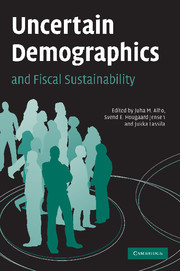Book contents
- Frontmatter
- Contents
- List of figures
- List of tables
- List of contributors
- Preface
- 1 Introduction
- Part I Uncertain demographics
- Part II Measuring sustainability in a stochastic environment
- 4 Fiscal implications of demographic uncertainty: comparisons across the European Union
- 5 Demographic uncertainty and pension projections
- 6 Demographic uncertainty and health care expenditure
- Comment: Assessing the uncertainty in long-term fiscal projections
- Part III Enhancing sustainability
- Part IV Extensions
- Index
- References
5 - Demographic uncertainty and pension projections
Published online by Cambridge University Press: 22 September 2009
- Frontmatter
- Contents
- List of figures
- List of tables
- List of contributors
- Preface
- 1 Introduction
- Part I Uncertain demographics
- Part II Measuring sustainability in a stochastic environment
- 4 Fiscal implications of demographic uncertainty: comparisons across the European Union
- 5 Demographic uncertainty and pension projections
- 6 Demographic uncertainty and health care expenditure
- Comment: Assessing the uncertainty in long-term fiscal projections
- Part III Enhancing sustainability
- Part IV Extensions
- Index
- References
Summary
Introduction
With increasing understanding that populations are ageing and will continue to do so, long-term pension expenditure projections have become essential policy tools for all countries with pure pay-as-you-go or less than fully funded public pension systems. The most important background assumptions in these projections usually concern future demographics. It therefore seems particularly relevant to try to envision the uncertainty caused by future demographics in pension expenditure projections.
We summarize quantitative estimates of the uncertainty in long-term pension expenditure projections caused by demographic factors for Belgium, Denmark, Finland, Germany, the Netherlands, Spain and the United Kingdom. The estimates are obtained from model-based country studies. The demographic uncertainties are quantified by stochastic population simulations. The results unequivocally show a great deal of uncertainty in pension projections. There are significant differences between the uncertainty estimates in these countries. The differences partly reflect demographic factors, partly differences in pension systems and partly the properties of the models that were used.
We also relate the uncertainty estimates of the country studies to the uncertainty considerations in the recent projections by the Economic Policy Committee (EPC) of the European Commission (EPC, 2006). The EPC uses sensitivity analysis as a method to describe uncertainties. Not surprisingly, the resulting quantifications of deviations from the expected outcomes are small compared with those obtained in the country studies.
Finally, we consider the implications of the country studies for the future development of the tools for analysis.
- Type
- Chapter
- Information
- Uncertain Demographics and Fiscal Sustainability , pp. 82 - 93Publisher: Cambridge University PressPrint publication year: 2008
References
- 1
- Cited by



